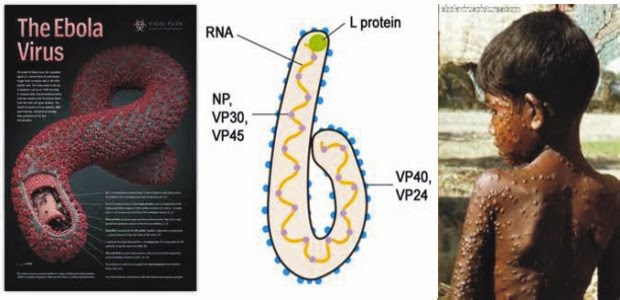A suspected case of the dreaded Ebola virus
which has been ravaging parts of East and Central Africa has been reported in
Lagos within the last 24 hours. A 40-year-old Liberian who entered Lagos from
Liberia at 4.00pm on Sunday was tested for the virus according to recent
breaking media reports, but has been reported dead a few hours ago. If all
suspicions are proved correct, this would be the first recorded case of one of
the world’s deadliest diseases in Nigeria.
This is a call to caution for residents as well as
visitors to Lagos State (and the entire country) as a matter of urgency as they
could get infected if the virus has not been safely contained and possibly
spread by the infected Liberian.
Some facts about Ebola every Nigerian needs to
know now.
Fast Facts about Ebola:
² Ebola Virus Disease (EVD), formerly known as
Ebola haemorrhagic fever, is a severe, often fatal illness in humans.
² The virus is transmitted from wild animals to
people and spreads in humans through person-person transmission.
² Fruit Bats of the Pteropodiae family are
considered to be the natural host of the Ebola virus.
² Severely ill patients require intensive support
care.
² Incubation period, that is the time interval
from infection with the virus to onset of symptoms, is 2 to 21 days.
² NO LICENSED SPECIFIC TRAETMENT OR VACCINE is
available.
How is Ebola Transmitted?
 Ebola is
transmitted through Close contact with the blood, secretions, organs or other
bodily fluids of infected animals. It can also be spread among humans from an
infected individual to healthy persons through
Ebola is
transmitted through Close contact with the blood, secretions, organs or other
bodily fluids of infected animals. It can also be spread among humans from an
infected individual to healthy persons through
o direct contact (broken skin or mucous membranes)
with the blood, secretions (sweat, urine, etc), organs or other bodily fluids
of infected people,
o indirect contact with environments contacted
with such fluids,
o burial ceremonies in which mourners have direct
contact with the body of the diseased person,
o men who have recovered from the disease can
still transmit the disease through their semen for up to 7 weeks after
recovery.
People at Highest Risk:
1.
Health-care
workers (e.g. doctors, nurses, lab scientists, etc) who have frequent contact
with patients, their body fluids, as well as infected environment,
2.
Workers in
contact with monkeys or pigs, and other infected animals,
3.
Abattoir
workers.
Signs and Symptoms of Ebola:
Ebola
is a severely acute viral illness often characterized by the sudden onset of
the following
§ Fever
§ Intense weakness
§ Muscle pain
§ Headache and sore throat
§ Vomiting, Diarrhea, Rash, Impaired kidney and
liver function, and in some cases both internal and external bleeding from eyes
and nose following.
Preventive measures:
Here are some preventive measures we all can
take to keep ourselves from getting infected by this deadly disease,
à
Routine
cleaning and disinfection of pig or
monkey farms with sodium hypochlorite (PRESEPTTM,
Bleach, etc) or other detergents,
à
Avoid
consumption of likely infected animals such as Fruit Bats, Monkeys & Pigs,
especially their raw meat,
à
Handle all
animals with gloves and other appropriate protective clothing,
à
Animal
products (Meat, Blood-sausage, etc) should be thoroughly cooked before
consumption,
à
Avoid close
contact with infected persons
à
Wash your
hands frequently with detergent or soap using clean water, especially after
visiting hospitals or taking care of patients, even at home,
à
Get a hand
sanitizer for visitors to your home, office, church, school to use and educate
them on the importance of sanitizers,
à
Avoid buying
foodstuff or other personal materials from markets & Shops that share the
same vicinity with live or roasted bush meat, dealers or sellers,
à
After
touching railings of stairs, door knobs, toilet seats and other utilities in
public places, ensure to wash hands or use sanitizer.
à
Watch out
for people with flu-like symptoms and sudden fever,
à
Gloves and
appropriate personal protective equipment should be worn when taking care of
ill patients even at home (especially for health workers and care givers).
In all this, it is important that we get
everyone enlightened about this virus, and more importantly do all we can to
prevent infection and spread of the virus.
For more information, visit the following
websites:
Centre for Disease Control - http://cdc.gov/vhf/ebola/prevention/index.html
Written by Precious
Nwanganga © 2014
Follow him on
twitter @Pmoney_Talks
Email him on
buzzfizzle@gmail.com

















No comments
Share your view on this post...